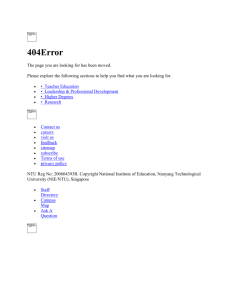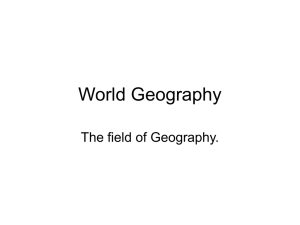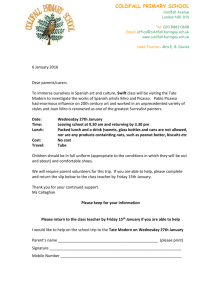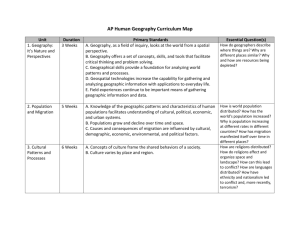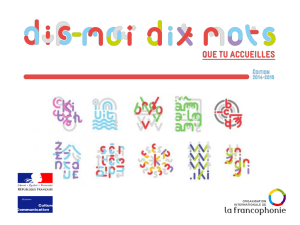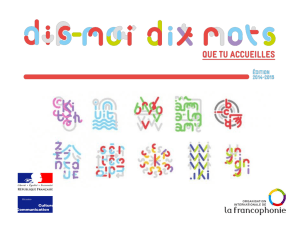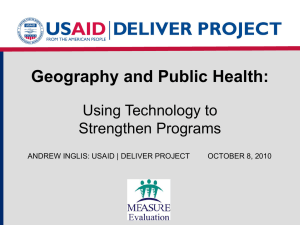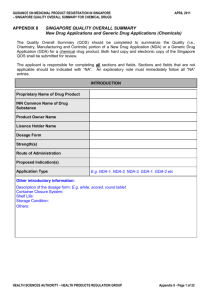subjects curriculum
advertisement
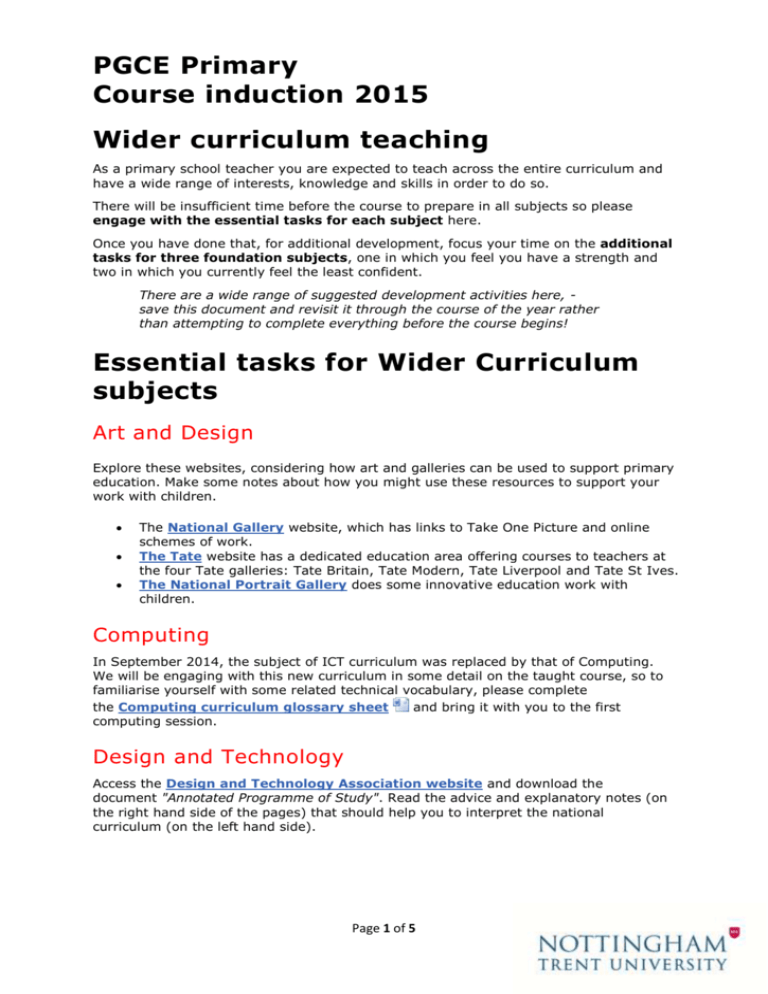
PGCE Primary Course induction 2015 Wider curriculum teaching As a primary school teacher you are expected to teach across the entire curriculum and have a wide range of interests, knowledge and skills in order to do so. There will be insufficient time before the course to prepare in all subjects so please engage with the essential tasks for each subject here. Once you have done that, for additional development, focus your time on the additional tasks for three foundation subjects, one in which you feel you have a strength and two in which you currently feel the least confident. There are a wide range of suggested development activities here, save this document and revisit it through the course of the year rather than attempting to complete everything before the course begins! Essential tasks for Wider Curriculum subjects Art and Design Explore these websites, considering how art and galleries can be used to support primary education. Make some notes about how you might use these resources to support your work with children. The National Gallery website, which has links to Take One Picture and online schemes of work. The Tate website has a dedicated education area offering courses to teachers at the four Tate galleries: Tate Britain, Tate Modern, Tate Liverpool and Tate St Ives. The National Portrait Gallery does some innovative education work with children. Computing In September 2014, the subject of ICT curriculum was replaced by that of Computing. We will be engaging with this new curriculum in some detail on the taught course, so to familiarise yourself with some related technical vocabulary, please complete the Computing curriculum glossary sheet and bring it with you to the first computing session. Design and Technology Access the Design and Technology Association website and download the document "Annotated Programme of Study". Read the advice and explanatory notes (on the right hand side of the pages) that should help you to interpret the national curriculum (on the left hand side). Page 1 of 5 Geography Take a walk around your local area and make a record (through photos, sketches and written reflections) of how you view this locality and what it means to you. Bring this with you to our first geography session. History Find a photo of a specific location within your immediate locality which was taken 100 years ago. Try the Picture the Past website. Take a photo form the same vantage point today. Put both images on an A3 sheet of paper and annotate similarities and differences. Consider why things have stayed the same or changed. Languages Think about any languages other than English that you know some words or phrases in. Record the range of these languages and the level of your knowledge of them (including qualifications that you might have achieved). Consider your own experiences of learning a language and identify which aspects that you have found most challenging. Music Access and read the key messages form the following: Ofsted Report: Wider still and wider The Importance of Music: A National Plan for Music Education Physical Education View the videos and follow up materials at Education Scotland. Use this to help you reflect on your own experiences of physical education in school. Review your own fitness levels and sport expertise - as a teacher of the subject in a primary school you will become a role model. Religious Education Mind-map what Religious Education means to you. What purpose does it serve? Why do we teach it in schools? Is it important? Why / why not? What should it include? Bring this to our first RE session. Page 2 of 5 Additional tasks for Wider Curriculum subjects Art and Design Visit a gallery or museum and consider learning outside the classroom: Imagine what could be taught in terms of reading stories in paintings, history through paintings, geography through paintings. How would you introduce a group of children to a work of art? What subject knowledge and background research do you need? Access the Take One Picture website: Look at the different ways that a painting can be used in cross-curriculum planning. Select an artwork (2D or 3D) and image the activities that could be linked to it. Read: Cox S & Watt R, (2007 Teaching Art and Design: Reaching the Standards 3-11. Continuum London (not available as an e-copy, but copies available in the library). Some useful websites: The Campaign for Drawing. It is worth visiting the Big Draw which takes place every Autumn. The site of the National Society for Education in Art and Design. This links to online journals and to START magazine for teachers of art and craft. Consider making a subscription to the NSEAD magazine START. It is £30 a year. The magazine contains articles on activities, galleries and materials all relevant to your future careers. Subscriptions can be made online on the NSEAD website. Computing Download Computing in the national curriculum: A guide for primary teachers . Read the following pages, and consider your main personal priorities in terms of meeting the challenges of this new curriculum; An overview of the Programme of Study: 'Getting started', pages 5 - 6 Some considerations for teaching computing: 'Teaching', pages 18 - 19 Download the publication, Education futures, teachers and technology (Futurelab 2012). This is a short but challenging discussion on the future of teaching in relation to technology. Page 3 of 5 Design and Technology Access the Design and Technology Association website and explore some of the other documents here. Access any of the following sites to gain further knowledge of the scope of design and Technology and ways of approaching learning and teaching in this subject: Working with food Working with textiles Resources to support teaching; scroll down to access the resources. Geography Access the Geographical Association website: Become familiar with the section entitled EY and Primary. Reflect on your own experiences of school geography and your subject knowledge in this area. Find opportunities to develop your experience and understanding of geography through: o exploring natural and built environments (with children if possible) o watching documentaries and films o keeping up with issues related to global warming and sustainability o reading travel literature o exploring maps and atlases – plot the places you have visited, or have connections with, on a European or World map. Global Citizenship or Values Education Access and consider how this might be achieved in a primary school context: A Curriculum for Global Citizenship: A guide for teachers and education workers on the Oxfam website. Access and browse: The Global Dimension Website You could read: Bigger, S. and Brown, E. (1999) Spiritual, Moral, Social and Cultural education, London, David Fulton. (not available as an e-copy, but copies available in the library.) History Reflect on your own experiences of school history and your subject knowledge in this area. Find opportunities to develop your experience and understanding of history through: o visiting museums and historical sites (with children if possible) o watching documentaries and films o reading historical fiction and non-fiction o talking to your family about family history - how much do you know about your roots? - create a timeline or family tree. Page 4 of 5 Languages The teaching of a language is new to the national curriculum. Access these websites to develop your awareness of the resources available to support teaching: The CILT Primary Languages site BBC Primary Languages Music You could access and read: Glover, J. and Ward, S. (ed) (2004) Teaching Music in the Primary School, London: Continuum (not available as an e-copy, but copies available in the library). Glover, J. and Young, S. (1999) Primary Music: Later Years, London: Falmer Press (available as an e-copy once you have enrolled at NTU). Physical Education You could read one of the following: Doherty, J. and Brennan, P. (2008) Physical Education 3-11: a guide for teachers, London: Routledge (available as an e-copy once you have enrolled at NTU). Pickup and Price (2007) Teaching Physical Education in the Primary School: A Development Approach,London: Continuum (not available as an e-copy, but copies available in the library). Hopper, B. et al (2000) Teaching Physical Education in the Primary School, London: Routledge Falmer (available as an e-copy once you have enrolled at NTU). Pickup, I. et al (2008) Learning to Teach Primary PE, Exeter: Learning Matters (available as an e-copy once you have enrolled at NTU). Also think about any physical education lessons you have recently observed in your school visits in the light of the issues raised in the recommended readings above. Religious Education Familiarise yourself with the local Agreed Syllabus for Nottinghamshire, Leicestershire and Derbyshire: Derbyshire's Agreed Syllabus Nottinghamshire's Agreed Syllabus Leicestershire's Agreed Syllabus Page 5 of 5
